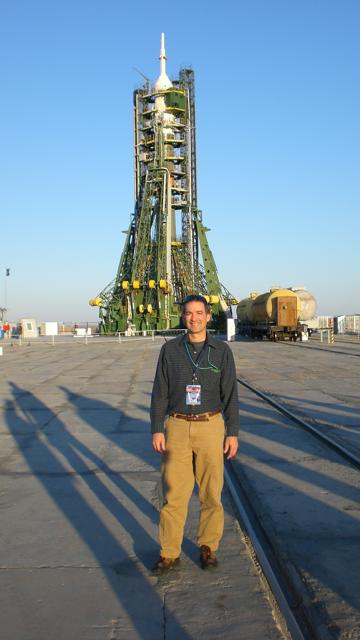Before Dr. David Ward's career brought him to the mountains of Western North Carolina, he had his eye on outer space. After serving as a NASA flight surgeon in 1993, Ward put in four years with the U.S./Russia Shuttle-Mir Program in Star City, Russia. Now a solo general practitioner in Brevard, Ward says the things he learned as a flight surgeon still apply to his earthbound medical work.
Mountain Xpress: Which was your first love, space or medicine?
David Ward: My second-grade teacher swears she has an essay I wrote about what I'm going to do when I grow up [that says], 'I'm going to be a doctor for the astronauts.' So the two have kind of always gone hand in hand for me. I was part of the generation born in the ’60s, who grew up watching all the space events and everything. Anything to do with space flight, I wanted to be there watching it.
Did you ever feel you had to choose between the two?
At one point, yes, there was that pressure. It's hard to go into college and have people say you have to make a decision: You have to do one or the other. I knew it was difficult to do both, but I did know there was an aerospace facility for training after medical school. I always knew in the back of my mind there was a way to do both, and that carried me through. I was fortunate enough to have a NASA grant spot for my fellowship grant at Johnson Space Center.
You worked as a flight surgeon for NASA there. What was that like?
A flight surgeon is essentially the family doctor for the astronaut corps. You're involved in everything from medical selection of astronauts into the corps to retention of those astronauts. You're involved in their basic care, and additionally you help the crew through any medical experiments and preflight certifications, and train them to do basic medical tasks on board.
What kinds of medical conditions do astronauts run into in space?
With short flights, you don't expect as many issues or problems, but there's always that potential. On long flights, there's much more involved: changes to the body [such as] bone loss, muscle loss. Sometimes there are vision or neurological changes. And when you think about it, being isolated and living in orbit can really have some social and psychological implications. We usually had a private medical conference each day with the crew members, just asking how they’re doing. The first two days in orbit can be difficult, adaptation-wise, for them. There are minor illnesses that can occur, like space motion sickness. In the shuttle program, two-thirds of all the astronauts have some amount of space motion sickness. So we train crew members how to treat it, but also see how they’re doing, if there are any complaints or problems, and just talk with the crew every day. It's kind of like a phone call to your doctor, except they were in space.
Where would you be during a mission?
We're in mission control, on the ground, both monitoring their health and being an advocate for the crew. You tried to really know your crew member and know them well. You spend all this time together in preflight and, when the mission is happening, you're able to anticipate and understand their needs in orbit, even if there’s poor communication or other issues. We're here to smooth things out for them, as an advocate for their health and their life.
How much does your experience as a flight surgeon carry over to your work as a physician in Brevard?
The two are a lot closer than you'd think. Some of the side effects of space flight are things we would normally see in aging, like osteoporosis, muscle atrophy, and changes in balance and coordination. As a flight surgeon, I took preventive measures and prepared the astronauts for these changes; I can take the same preventive approach used in space flight and try to find analogous ways to use that here for folks on Earth.
I take it space is still very much a part of who you are as a doctor. Do you have lots of space memorabilia in your office?
I do have lots of eye candy up on the walls from former crews of mine (laughs). Let's just say I have a lot of interesting places to start a conversation, both [concerning] space flight and health.
— UNCA senior Caitin Byrd is an editor at The Blue Banner, the campus paper.
Send your health-and-wellness news to mxhealth@mountainx.com or news@mountainx.com.




Before you comment
The comments section is here to provide a platform for civil dialogue on the issues we face together as a local community. Xpress is committed to offering this platform for all voices, but when the tone of the discussion gets nasty or strays off topic, we believe many people choose not to participate. Xpress editors are determined to moderate comments to ensure a constructive interchange is maintained. All comments judged not to be in keeping with the spirit of civil discourse will be removed and repeat violators will be banned. See here for our terms of service. Thank you for being part of this effort to promote respectful discussion.